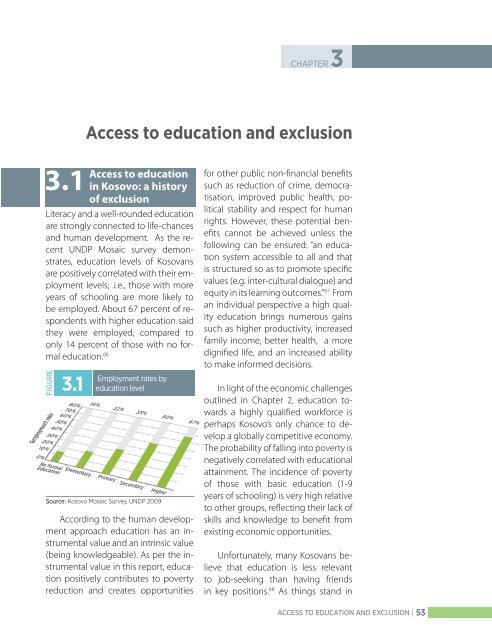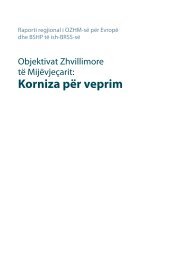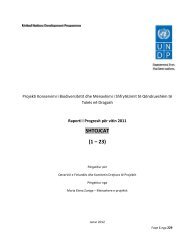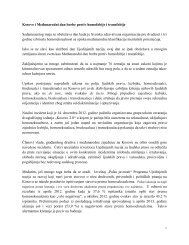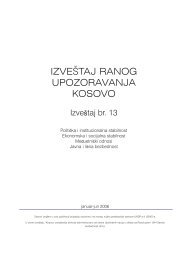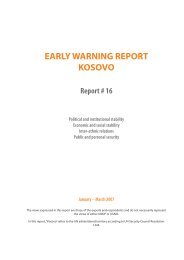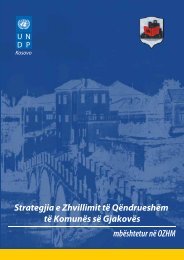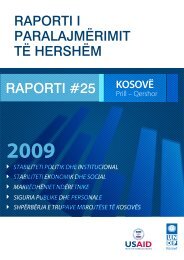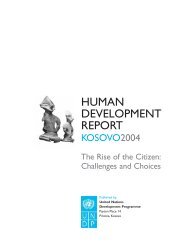Kosovo Human Development Report 2010 - UNDP Kosovo - United ...
Kosovo Human Development Report 2010 - UNDP Kosovo - United ...
Kosovo Human Development Report 2010 - UNDP Kosovo - United ...
You also want an ePaper? Increase the reach of your titles
YUMPU automatically turns print PDFs into web optimized ePapers that Google loves.
3.1<br />
Access to education and exclusion<br />
Access to education<br />
in <strong>Kosovo</strong>: a history<br />
of exclusion<br />
Literacy and a well-rounded education<br />
are strongly connected to life-chances<br />
and human development. As the recent<br />
<strong>UNDP</strong> Mosaic survey demonstrates,<br />
education levels of Kosovans<br />
are positively correlated with their employment<br />
levels; .i.e., those with more<br />
years of schooling are more likely to<br />
be employed. About 67 percent of respondents<br />
with higher education said<br />
they were employed, compared to<br />
only 14 percent of those with no formal<br />
education. 66<br />
FIGURe<br />
3.1<br />
Employment rates by<br />
education level<br />
14% 22%<br />
80%<br />
33% 50% 67%<br />
70%<br />
60%<br />
50%<br />
40%<br />
30%<br />
20%<br />
10%<br />
0%<br />
employment rate<br />
elementary<br />
Primary<br />
Secondary Higher<br />
Source: <strong>Kosovo</strong> Mosaic Survey, <strong>UNDP</strong> 2009<br />
According to the human development<br />
approach education has an instrumental<br />
value and an intrinsic value<br />
(being knowledgeable). As per the instrumental<br />
value in this report, education<br />
positively contributes to poverty<br />
reduction and creates opportunities<br />
CHAPTER 3<br />
for other public non-financial benefits<br />
such as reduction of crime, democratisation,<br />
improved public health, political<br />
stability and respect for human<br />
rights. However, these potential benefits<br />
cannot be achieved unless the<br />
following can be ensured: “an education<br />
system accessible to all and that<br />
is structured so as to promote specific<br />
values (e.g. inter-cultural dialogue) and<br />
equity in its learning outcomes.” 67 From<br />
an individual perspective a high quality<br />
education brings numerous gains<br />
such as higher productivity, increased<br />
family income, better health, a more<br />
dignified life, and an increased ability<br />
to make informed decisions.<br />
In light of the economic challenges<br />
outlined in Chapter 2, education towards<br />
a highly qualified workforce is<br />
perhaps <strong>Kosovo</strong>’s only chance to develop<br />
a globally competitive economy.<br />
The probability of falling into poverty is<br />
negatively correlated with educational<br />
attainment. The incidence of poverty<br />
of those with basic education (1-9<br />
years of schooling) is very high relative<br />
to other groups, reflecting their lack of<br />
skills and knowledge to benefit from<br />
existing economic opportunities.<br />
Unfortunately, many Kosovans believe<br />
that education is less relevant<br />
to job-seeking than having friends<br />
in key positions. 68 As things stand in<br />
ACCESS TO EDUCATION AND EXCLUSION | 53


